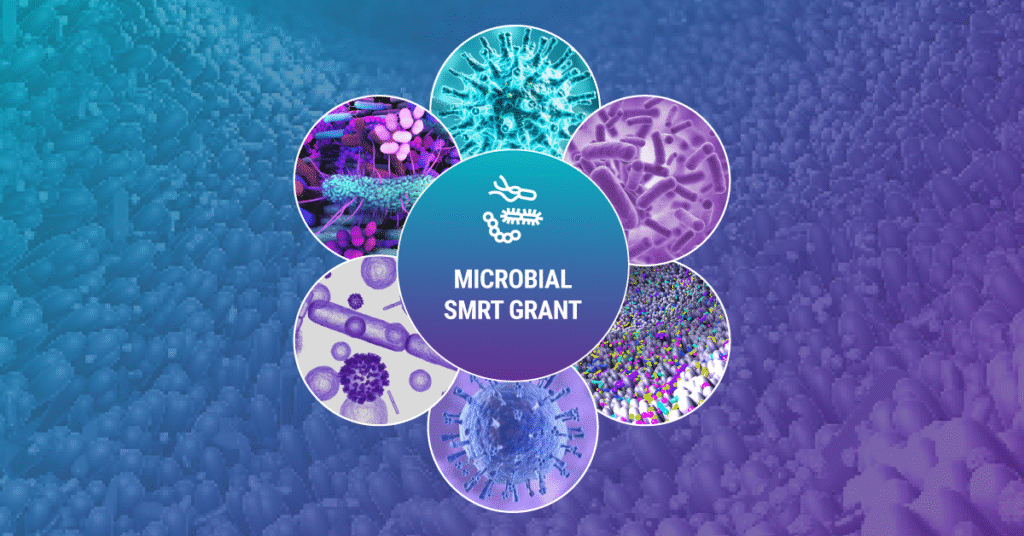We are thrilled to announce the winners of the 2025 Microbiome SMRT Grant for HiFi shotgun metagenomics. This year’s program received hundreds of amazing proposals from researchers around the globe, each one on the pursuit to learn even more from the microbiome. With so many groundbreaking ideas, we couldn’t stop at just one awardee, so we picked four!
Join us in congratulating these bold scientists who are charting the future of human microbiome and metagenomics research. We can’t wait to see the discoveries they’ll uncover with the power of high-accuracy, long-read HiFi sequencing.
Winners:

Hannah Glesener, BS
PhD Candidate in Biological Design
Biodesign Institute, Center for Health Through Microbiomes
Arizona State University
The project:
Metagenomic characterization of gut microbiomes in mother-child pairs from a population with high chronic malnutrition
We aim to understand how the gut microbiome contributes to childhood growth stunting, focusing on Guatemala where stunting rates are high and microbiome data is scarce. Preliminary HiFi full-length 16S rRNA data suggest significant microbiome differences between stunted and healthy children, but deeper insights require metagenomic sequencing. We will conduct metagenomic sequencing of previously collected fecal samples from 12 mother–child dyads with chronically malnourished and healthy children to compare microbiome composition and function. Sequencing mother–child pairs will enable exploration of intergenerational microbial patterns. These data will offer critical insight into microbiome–growth links and support mechanistic discovery in this understudied population.
 |
 |
| Long H. Nguyen, MD, MS Assistant Professor of Medicine Massachusetts General Hospital & Harvard Medical School Bluesky | X | LinkedIn |
Kelsey Thompson, PhD Research Scientist Huttenhower Lab, Department of Biostatistics Harvard T.H. Chan School of Public Health LinkedIn | Lab website |
The project: HiFi-IBD: High-resolution taxonomic and functional profiling in inflammatory bowel disease
We are collaborating to optimize PacBio-compatible protocols for gut metagenomics. As a pilot, we aim to generate high-quality, long-read data from inflammatory bowel disease (IBD) samples collected as part of the prestigious Nurses’ Health Study 2. This will enable precise functional gene profiling (e.g., via HUMAnN 4) and strain-resolved analysis not possible with short reads. This project will yield high-impact science, strong academic visibility, and commercial momentum across Harvard cohorts and beyond, positioning PacBio as the platform of choice for advanced microbiome discovery.

Thoranin Intarajak, PhD
Researcher
Bioinformatics for Genome Analysis Laboratory
Chulabhorn Royal Academy, Bangkok, Thailand
LinkedIn
The project: Functional study of gut microbiome in patients with colorectal adenomasColorectal polyps that arise through the adenoma-carcinoma sequence carry a high risk of progressing to colorectal cancer. In our previous study, we used HiFi full-length 16S rRNA sequencing, revealing predicted metabolic pathways associated with these polyps. To gain deeper insights and investigate the role of the gut microbiome in this progression to colorectal cancer, fecal specimens from patients with colorectal adenomas will be subjected to HiFi shotgun metagenomic sequencing. This approach enables the reconstruction of Metagenome-Assembled Genomes (MAGs) and allows for precise taxonomic and functional profiling of microbial communities. The resulting data will offer insight into how microorganisms contribute to the adenoma-carcinoma sequence. This study aims to identify specific microorganisms that play a key role in this process, potentially revealing novel targets for microbiome-based prevention and therapy in early colorectal carcinogenesis.
 Natasha Arora, PhD
Natasha Arora, PhD
Head of Research
Forensic Genetics Department, Zurich Institute of Forensic Medicine
University of Zurich
LinkedIn | Lab website | TEDx talk
The project: The Sexome: Strain-resolved metagenomics of vaginal and penile microbiota for forensic and clinical applications
We will apply PacBio HiFi metagenomic sequencing to vaginal and penile swabs collected from 5 heterosexual couples before and after sexual intercourse, with extensive metadata available. These samples, previously analyzed via HiFi full-length 16S rRNA sequencing, offer a unique opportunity to explore sexually shared microbiota at strain level. By expanding to metagenomics, we will detect not only bacteria but also viruses, fungi, and archaea—advancing both forensic microbiome-based body fluid identification and research into how partner-associated microbial exchange influences women’s reproductive health. Highly accurate long reads are critical to resolving complex microbial communities and capturing fine-scale microbial dynamics missed by short-read approaches.
How to apply for PacBio grants
The PacBio Grant Program invites researchers across the world to apply for complimentary PacBio sequencing services for a diverse array of genomics research projects. To participate, choose an active grant program that aligns with your research area and complete the application by explaining how your important work would benefit from PacBio sequencing. Applications are thoroughly reviewed by experts in each application. Selected winners are notified by PacBio to arrange for free sequencing, which can include free consumables, library preparation, and preliminary bioinformatic analyses, all provided by an authorized sequencing service provider (terms and conditions apply).These opportunities include research across all areas of life sciences. For researchers decoding complex microbial communities, investigating cancer, conserving biodiversity, or exploring the most challenging regions of the human genome – there’s a PacBio grant designed to support your vision.A huge thank-you to all the applicants for sharing your inspiring ideas, and to our co-sponsors SeqCenter and Zymo Research for making the 2025 Microbiome SMRT Grant possible.
Curious about what’s next for your own research?
Explore our current opportunities.

